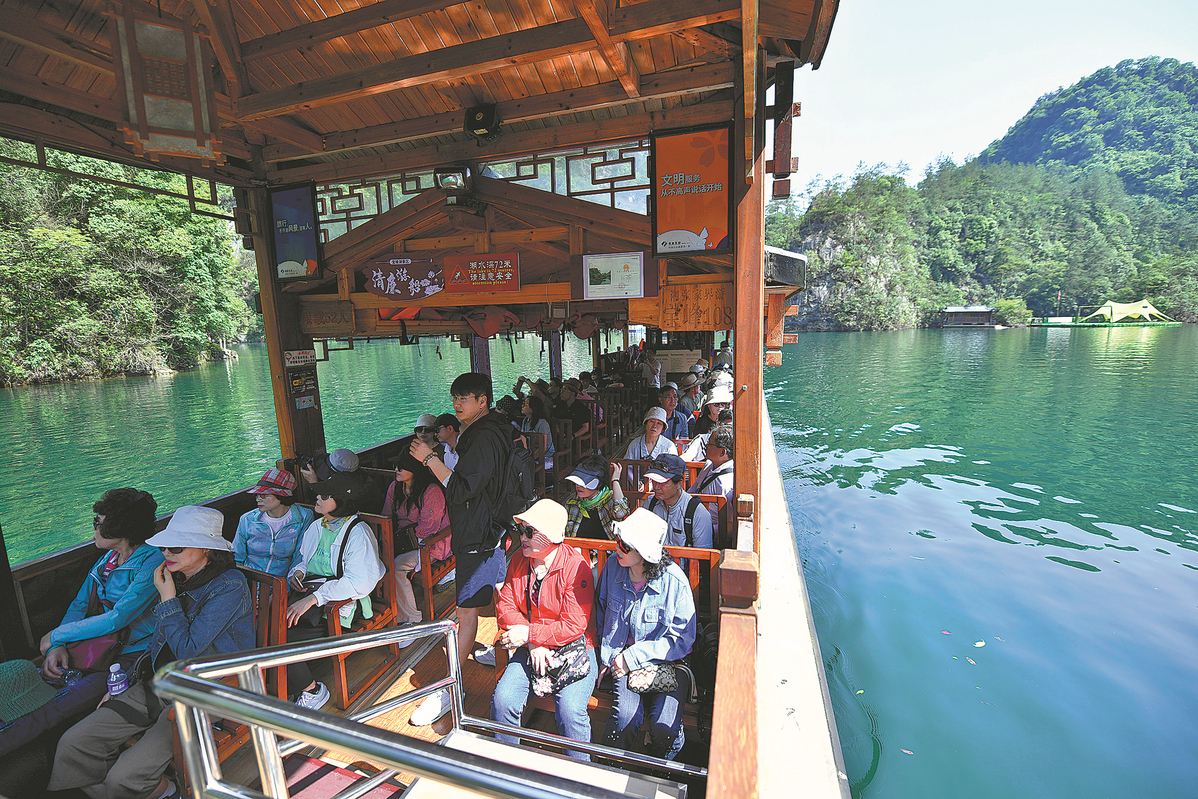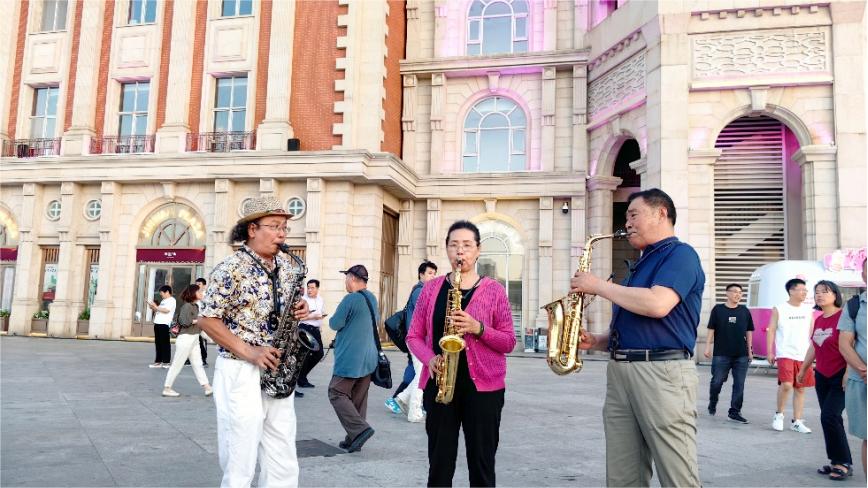Demand escalates for tour guides with foreign-language skills

A group of foreign tourists poses for a photo at the Palace Museum in Beijing, on April 25. (CHINA DAILY)
Tour guides who can speak foreign languages have become some of the most sought-after employees in China, as the inbound tourism market continues its rapid recovery.
"It feels like I've been working every day and have no time to take a short break," said Liu Yiling, a 31-year-old English-speaking tour guide in Beijing, who has worked in the tourism sector for six years.
"My friend in Shanghai, who is also an English-speaking tour guide and knows some French, has seen her daily pay surge to 1,500 yuan ($206) from around late April," he added.
In 2021, when the tourism industry was hard hit by the COVID-19 epidemic, Liu switched jobs from being a tour guide to a preschool teacher.
"My career had bleak prospects and I transferred to the education sector," he said. "But I still loved being a tour guide, because the human touch and person-to-person communication are really attractive to me. So I decided to return to the tourism industry in February."
The must-see Beijing attractions for foreign visitors are the cultural and historical highlights of the Palace Museum, the Great Wall, and the Summer Palace, he said.
"We tour guides are like multitaskers who are responsible for interpretation work, managing foreigners' accommodation and itineraries, and more importantly, explaining to them China's customs and culture," Liu said.
His current monthly pay is 15,000 to 20,000 yuan, and he is confident about the tourism market's performance this summer — the traditional peak season.
Inbound rebound
This year's inbound tourism boom has been fueled by authorities allowing visa-free entry for ordinary passport-holders from more than a dozen countries — including France, Germany, Italy, the Netherlands, Spain, Ireland, Switzerland, and Malaysia — and China's enhanced image as a global tourism destination.
Central authorities also released a series of policies to make it easier for foreign visitors to use their bank cards in China and e-payment apps on their phones.
These moves have seen encouraging results.
The National Immigration Administration said it issued 466,000 visas to international travelers in the first quarter of 2024, up almost 120 percent year-on-year. Nearly 2 million visits were made to the mainland by visa-exempt foreign nationals in the first quarter, up 266 percent year-on-year.
In the first quarter, inbound travel bookings registered three-fold growth year-on-year, with most of the visitors coming from Japan, Malaysia, South Korea, the United States, and Australia, said travel portal Trip.com Group.
Among the top city destinations for international travelers were Beijing, Shanghai, and Guangzhou, capital of Guangdong province, the group said.
The Chinese mainland saw a surge in international travelers during the May Day holiday, with Ministry of Culture and Tourism figures showing 1.76 million inbound trips during the five-day period.
This success, however, has raised concerns about tourism industry workers lacking the foreign-language skills to cope with the rapidly expanding number of international visitors.
The mainland has 650,000 certified tour guides, according to Ministry of Culture and Tourism statistics. Of those, 93 percent speak Mandarin, 6 percent English, and only 1 percent another language such as German or Spanish.
Xu Xiaolei, chief brand officer of CYTS Tours Holding Co in Beijing, said that the employment market for tour guides often fluctuates. This is due to occasional understaffing problems and seasonal demands, for example during peak periods when guides who speak a less-widely used language are required, and other issues.
"The industry has had a problem of staff shortages, and many foreign-language speaking guides switched their jobs to other industries due to the epidemic or the impacts of the tourism industry upgrading itself. Unsatisfactory pay and the lower social status of the job may also discourage new college graduates from entering the industry," he said.
Every tourism industry job, whether in an office or outside, is hard work and high pressure and requires workers who are passionate and energetic and possess good general knowledge and linguistic skills, he added.
"Tour guides, especially those handling international travelers, are usually all-rounders, as they have to interpret and explain China's history, culture and geography to foreigners. He or she should have the ability to keep learning and be alert to political and cultural differences," he added. "It's a challenging job."
Sharing culture
Jin Zhengwen, 31, has worked as a tour guide for nearly six years. He holds a Mandarin-language tour guide license but can speak fluent Korean. Jin said what he cares about most is the satisfaction he gets from his work, and explaining China's cultural heritage to visitors.
"I worked in South Korea from 2016 and returned to Yanbian Korean autonomous prefecture in Northeast China's Jilin province around 2018," he said. "I'm from a Korean ethnic group, but spoke very poor Korean before I went to South Korea and honed my language skills there."
Jin said a good tour guide needs to connect with his or her clients. "From my experience, it's of great importance to resonate with foreign travelers and get to learn their real needs," he said.
The travel agency he works for has about four tour guides who speak Korean. However, in peak season it is in dire need of temporary staff who can speak Korean, he said.
"A foreign-language speaking guide might have been a good money-making job 10 or 20 years ago, but things have changed in recent years. The job is not that stable, and many of my peers work outside the prefecture or in big cities for higher pay," he added.
Song Xueyan is a 43-year-old Russian-language tour guide who started his career in 2008 in Hunchun, Jilin, which shares a border with Russia.
"Russian was my college major. I thought my language skills would return to zero if didn't use them for a long time, so I decided to be a Russian-language tour guide," he said.
"It's not an easy job because I need to be on call 24 hours in case the travelers have some emergencies."
Seasonal fluctuations mean the pay is not steady, Song said.
"In peak season, I earn about 400 yuan a day guiding a tour group, while the payment falls to 200 or 300 a day in the slack season," he said. "I usually head to Sanya, the coastal city in the southern province of Hainan during, the slack season."
Around 2020, amid the COVID-19 epidemic, he started operating his own social media account to teach Russian free of charge. During that period he also began foreign trading and gained a teaching certification.
"I'm always grateful that my language skills gained me a place in society. Foreigners are no different from us, and communication can help us understand each other," he said.

Korean tourists take a boat ride in Zhangjiajie Scenic Area in Hunan province. (CHEN ZHENHAI/XINHUA)
Looking for recruits
With the boom in the inbound tourism market, travel companies are seeking to hire more foreign-language graduates and talented young people.
The number of jobs in the tourism and leisure industries has increased continuously from the second quarter of 2023 after the nation loosened travel policies earlier that year, the latest figures from recruitment platform Zhaopin show.
Jobs in the sector surged 96.3 percent year-on-year in the second quarter, 53.6 percent in the third quarter, and 83.4 percent in the final quarter.
The market's recruitment needs for tourism talent increased 32.1 percent year-on-year in the first quarter of this year, according to Zhaopin.
"We have been recruiting tour guides who speak fluent Russian for quite a long time. We now have about 15 full-time Russian-language guides and hire temporary workers over the summer, usually college students for part-time jobs," said Li Yao, general manager of Heihe Youth Travel Services Co. in northeastern Heilongjiang province.
The company mainly operates cross-border tourism services between China and Russia.
He said it's not easy to pass the exam and get a national permit to operate as a tour guide. The pay of tour guides is also dependent on the economic situation of the province a tour guide works in, Li added.
"Many tourism companies in southern or eastern provinces may offer higher salaries than us in the northern provinces; 3,000 to 4,000 yuan per month is what we can usually offer. So it's harder for us to hire guides who speak foreign languages," he said.
Yu Zikang, 22, who majors in German at Changshu Institute of Technology in Jiangsu province and just graduated in June, said that language is a basic skill for a tour guide, and people who are extroverted may be more suited for the job.
Yu's friend Zhou Keying, who also studies German, said she wouldn't mind trying her hand working as a tour guide, though it's not her first choice of career.
"I may not be competitive in finding a job in the industry because my spoken German is not that good," she said.
"Being a tour guide involves a lot of pressure handling possible emergencies every day, and paying attention to cultural differences when dealing with international travelers in case of any offensive words or behavior.
"I love traveling and I wouldn't mind trying to be a tour guide if I got the opportunity," she said.
Greater efforts should be made to boost the job status and pay of tourism industry workers to attract more college graduates and talented young people, experts said.
"Based on our survey, we found that except for the pay, young people also care about work-life balance, a fair and friendly company culture, and good career prospects," said Li Qiang, vice president of Zhaopin.
"So tourism companies can use more flexible work schedules and develop thorough training and promotion plans for young people who show a willingness to join the industry."
It's also important to tighten the management of tour guide positions and crack down on improper or illegal behavior that encroaches on workers' rights in order to bolster the image of the industry, he added.
"Also, tourism companies can develop more new products that appeal to international travelers to let foreign-language speakers get greater personal satisfaction from the work," Li Qiang said.
Zhou Huiying in Harbin and Han Junhong in Changchun contributed to this story.
Photos
Related Stories
- China enhances payment accessibility for int'l visitors
- Travel surge continues as festival spurs demand
- China's bond with world to be closer: foreign ministry
- Inbound tourism drive sparks optimistic outlook
- China’s travel surge continues as Dragon Boat Festival expected to further stimulate domestic consumption
- Chinese outbound travel bookings surge as holiday nears, injecting strong confidence, momentum into world tourism market
Copyright © 2024 People's Daily Online. All Rights Reserved.









